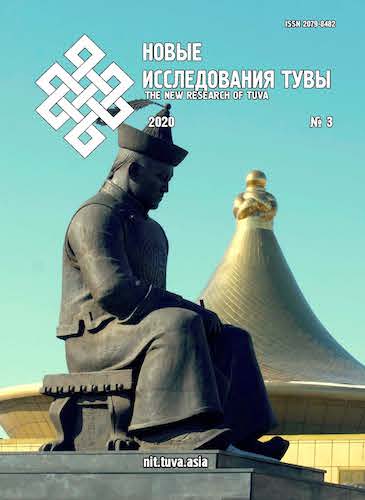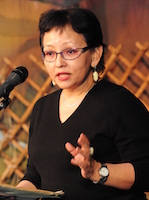Cultural policy of the Tuvan People’s Republic and public festivities
DOI:
https://doi.org/10.25178/nit.2020.3.7Keywords:
Tuvan People’s Republic; history of Tuva; Tuva; Tuvans; cultural policy; festival; public holiday; Socialist ideologyAbstract
The article discusses the main directions of the Tuvan People’s Republic state policy on holiday culture in the 1920s–30s, including the introduction of new types of festivities, such as rallies or demonstrations, and suppression and ultimate prohibition of traditional rituals and holiday. The new festivities aimed to reflect the changes in the social, political and economic life of the people of Tuva. For our sources, we rely on printed materials and previously unknown documents from the National Archives of the Republic of Tuva.
As far as celebrations are concerned, the cultural policy of the PRT appeared a combination of various, often contradictory or even mutually exclusive, trends. It can be divided into two periods differing in the main orientation of the region’s internal policy. In the earlier period, 1920s, traditional holidays, including religious ones, were still allowed. Later, in the 1930s, Tuvan People’s Revolutionary Party pursued a new sociocultural policy which proclaimed drastic change and radical break with the past. Everything pertaining to the traditional culture: rituals and holidays, food and apparel, the yurt, even throat singing and the arts of woodcut and stone carving was labelled “backward”. Festivals were political, rather than cultural, events, and thus organizing them was the government’s responsibility, entrusted to ad hoc committees.
Over a short period of time, Tuvan’s festival culture underwent drastic change.
References
Badyrgy, M. M. and Munge, B. V. (2020) Dokumenty Natsional'nogo arkhiva Respubliki Tyva po kul'turnomu stroitel'stvu Tuvinskoi Narodnoi Respubliki [“Cultural Upbuilding” in People’s Republic of Tuva in documents preserved at National Archives of Republic of Tuva]. The New Research of Tuva, no. 2, pp. 145–164. (In Russ.). DOI: www.doi.org/10.25178/nit.2020.2.10
Vainshtein, S. I. (1961) Tuvintsy-todzhintsy. Istoriko-etnograficheskie ocherki [Tozhu Tuvans: historical and ethnographic essays]. Moscow, Nauka. 218 p. (In Russ.).
Vainshtein, S. I. (1972) Istoricheskaia etnografiia tuvintsev. Problemy kochevogo khoziaistva [Historical Ethnography of Tuvans. Problems of nomadic economy]. Moscow, Nauka. 314 p. (In Russ.).
D'iakonova, V. P. (1971) Tsam u tuvintsev [Tsam among Tuvans]. In: Religioznye predstavleniia i obriady narodov Sibiri v XIX — nachale XX v. [Religious representations and rites of the peoples of Siberia in the XIX-early XX century] / ed. by S. V. Ivanov. Leningrad, Nauka. 301 p. Pp. 113–128. (In Russ.).
D'iakonova, V. P. (1976) Religioznye predstavleniia altaitsev i tuvintsev o prirode i cheloveke [Religious beliefs of Altaians and Tuvans about nature and man]. In: Priroda i chelovek v religioznykh predstavleniiakh narodov Sibiri i Severa [Nature and man in the religious beliefs of the peoples of Siberia and the North] / ed. by I. S. Vdovin. Leningrad, Nauka. 336 p. Pp. 268–292. (In Russ.).
Istoriia Tuvy [The History Of Tuva] (2007): in 3 vols. / ed. by V. A. Lamin. Novosibirsk, Nauka. Vol. 2. 430 p. (In Russ.).
Kenin-Lopsan, M. B. (1987) Obriadovaia praktika i fol'klor tuvinskogo shamanstva. Konets XIX — nachalo XX v. [Ritual practice and folklore of Tuvinian shamanism. Late XIX - early XX century.]. Novosibirsk, Nauka. 165 p. (In Russ.).
Kenin-Lopsan, M. B. (2004) Oitulaash. Klassicheskie obraztsy liubovnoi liriki tuvinskogo naroda [Oitulaash. Classic examples of love lyrics of the Tuvan people]. Kyzyl, Novosti Tuvy. 383 p. (In Russ.).
Kenin-Lopsan, M. B. (2006) Traditsionnaia kul'tura tuvintsev [Traditional culture of Tuvans]. Kyzyl, Tuvan book publisher. 232 p. (In Russ.).
Klimov, E. N. (1964) Novye obychai i prazdniki [New customs and holidays]. Moscow, Profizdat. 172 p. (In Russ.).
Konovich, A. A. (1990) Teatralizovannye prazdniki i obriady v SSSR [Theatrical holidays and ceremonies in the USSR]. Moscow, Vysshaia shkola. 208 p. (In Russ.).
Konstitutsii Tuvy [Constitutions of Tuva] (1999): a collection for the 55th anniversary of Tuva's accession to the USSR and RSFSR. Kyzyl, Tuvan book publishing house. 216 p. (In Russ.).
Kuzhuget, A. K. (2006) Dukhovnaia kul'tura tuvintsev. Struktura i transformatsiia [The immaterial culture of Tuvans. Structure and transformation]. Kemerovo, KemGUKI. 319 p. (In Russ.)
Kuz'mina, T. and Maslov E. (1975) Prazdnikam i obychaiam — novoe sotsialisticheskoe soderzhanie [Holidays and customs — a new socialist content]. Moscow, Profizdat. 268 p. (In Russ.).
Kurbatskii, G. N. (1973) Tuvinskie prazdniki [Tuvan holidays]. Kyzyl, Tuva book publishing house. 90 p. (In Russ.).
Lenin, V. I. (1969) Polnoe sobranie sochinenii [Complete works]: in 55 vols. 5nd ed. Moscow, Izdatel'stvo politicheskoi literatury. Vol. 36. 741 p. (In Russ.).
Mainy, Sh. B. (2014) Narodnye igry v traditsionnoi kul'ture tuvintsev: istoriko-kul'turologicheskii analiz [Folk games in the traditional culture of Tuvans: historical and cultural analysis]: Abstract of Diss. … Candidate of Cultural Studies. Kemerovo. 23 p. (In Russ.).
Maslov, P. P. (2007) Konets Uriankhaia. Putevye ocherki [The End Of Urianhai. Travel essays]. In: Uriankhai. Tyva depter [Uriankhai: A Tuvan Notebook]: in 7 vols. / comp. by S. K. Shoigu. Moscow, Slovo. Vol. 5. Uriankhaiskii krai: ot Uriankhaia k Tannu-Tuve (konets XIX — pervaia polovina XX v.) [Uriankhai Territory: from Uriankhai to Tannu-Tuva (late XIX — first half of XX century)]. 735 p. Pp. 618–729. (In Russ.).
Menkhen-Khel'fen, O. (2007) Puteshestvie v aziatskuiu Tuvu [A Journey to Asian Tuva]. In: Uriankhai. Tyva depter [Uriankhai: A Tuvan Notebook] : in 7 vols. / comp. by S. K. Shoigu. Moscow, Slovo/Slovo. Vol. 6. 584 p. Pp. 222–351. (In Russ.).
Mollerov, N. M. (2005) Istoriia sovetsko-tuvinskikh otnoshenii (1917–1944 gg.) [History of Soviet-Tuvan relations: 1917–1944]. Moscow, Moscow University for Humanities Publ. 326 p. (In Russ.).
Potapov, L. P. (1969) Ocherki narodnogo byta tuvintsev [The Tuvans: sketches of the folk lifestyle and related household activities]. Moscow, Nauka, GRVL. 402 p. (In Russ.).
Toka, S. K. (1987) Naveki vmeste [Forever together]. In: Slava Oktiabriu! [Glory to the October!], ed by A. K. Kanzai. Kyzyl, Tuvan book publisher. 219 p. Pp. 15–49. (In Russ.).
Shiriaeva, P. G. (1975) Iz istorii razvitiia nekotorykh revoliutsionnykh traditsii [From the history of the development of some revolutionary traditions]. Sovetskaia etnografiia, no. 6, pp. 63–70. (In Russ.).
Tsyrenova, Z. E. (2007) Traditsionnaia kul'tura korennykh narodov Vostochnoi Sibiri (1920 — konets 1980–kh gg.): opyt sokhraneniia razvitiia [Traditional culture of the indigenous peoples of Eastern Siberia (1920 — late 1980s): conservation and development]: Abstract of Diss. … Doctor of History. Ulan-Ude. 51 p. (In Russ.).
Yusha, Zh. M. (2005) Traditsionnaia narodnaia obriadovaia poeziia tuvintsev: struktura i semantika [Traditional folk ritual poetry of Tuvans: structure and semantics]: Diss. … Candidate of Philology. Novosibirsk. 194 p. (In Russ.).
Yakovlev, E. K. (1900) Etnograficheskii obzor inorodcheskogo naseleniya doliny Yuzhnogo Eniseya i ob’yasnitel'nyi katalog Etnograficheskogo otdela Muzeya [An ethnographic review of the South Yenisei Valley and the explanatory catalogue of the Museum’s Ethnography Research Department]. Minusinsk, V. I. Kornakov. 357 p. (In Russ.).
Published
How to Cite
Issue
Section

This work is licensed under a Creative Commons Attribution-NonCommercial 4.0 International License.

Author(s) license holder(s) grant rights for their work to the journal (grantee of a license) under the simple non-exclusive open license in accordance with Art. 1286.1 «Open license for a research work, work of literature or fine arts», Civil Code of the Russian Federation.
New Research of Tuva publishes articles under the Creative Commons Attribution-NonCommercial license (CC BY-NC).
Since it is an open license, author(s) reserve the right to upload the article to their institutional repository, submit it to another journal (if it allows republications), or republish it on their own website (in full, or in part).
However, several conditions apply here:
a) The republished version must always contain the name(s) and affiliation(s) of the author(s), the original title and the hyperlink to the original version on the New Research of Tuva website;
b) It must be in open access, free of charge, and no category of readers must be in any way whatsoever advantaged over general readership.
c) should the contribution be submitted elsewhere by its author(s) without substantial modification (30% or more of original text unchanged), the body of the article should contain a disclaimer that the original version was published in New Research of Tuva (with a link to the respective page)
The CC-BY-NC is a non-revocable license which applies worldwide and lasts for the duration of the work’s copyright.









